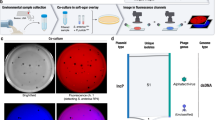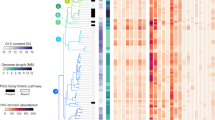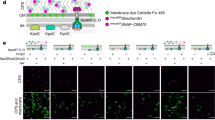Abstract
IN certain conditions, bacteria accumulate relatively large amounts of polyglucose compounds with properties similar to those of animal glycogen1. An interpretation of bacterial “glycogen” production is that it provides a food and/or energy reserve for the organisms in unfavourable environments; in other words, bacteria rich in glycogen should survive longer than bacteria without such reserves. Experimental results apparently supporting this teleological interpretation were obtained with Aerobacter aerogenes2 and Escherichia coli3 but not with Sarcina lutea4; glycogen-rich S. lutea died at a faster rate than cells without glycogen during starvation in aerated phosphate buffer at 37° C. A feature of glycogen reserves in bacteria is their rapid depletion during starvation which suggests that any contribution glycogen makes towards maintenance and survival is of short duration5. It is possible that growth conditions which stimulate the accumulation of glycogen give rise to bacteria better able to resist stress for reasons not concerned with their glycogen content. The effect of glycogen reserves on bacterial survival was examined with E. coli; cells containing different amounts of glycogen were grown in a chemostat and their survival properties were determined in aerated saline phosphate buffer with and without magnesium at 37° and 48° C.
This is a preview of subscription content, access via your institution
Access options
Subscribe to this journal
Receive 51 print issues and online access
$199.00 per year
only $3.90 per issue
Buy this article
- Purchase on Springer Link
- Instant access to full article PDF
Prices may be subject to local taxes which are calculated during checkout
Similar content being viewed by others
References
Holme, T., and Palmstierna, H., Acta Chem. Scand., 10, 1557 (1956); Holme, T., Acta Chem. Scand., 11, 763 (1957); Wilkinson, J. F., Exp. Cell. Res. Suppl., 7, 111 (1959); Dawes, E. A., and Ribbons, D. W., Ann. Rev. Microbiol., 16, 241 (1962).
Strange, R. E., Dark, F. A., and Ness, A. G., J. Gen. Microbiol., 25, 61 (1961).
Dawes, E. A., and Ribbons, D. W., J. Appl. Bact., 26, vi (1963).
Burleigh, I. G., and Dawes, E. A., Biochem. J., 102, 236 (1967).
Dawes, E. A., and Ribbons, D. W., Bact. Rev., 28, 126 (1964).
Strange, R. E., and Dark, F. A., J. Gen. Microbiol., 39, 215 (1965).
Trevelyan, W. E., and Harrison, J. S., Biochem. J., 50, 298 (1952).
Postgate, J. R., Crumpton, J. E., and Hunter, J. R., J. Gen. Microbiol., 24, 15 (1961).
Strange, R. E., and Hunter, J. R., in Microbial Physiology and Continuous Culture, 102 (HMSO, 1967).
Tempest, D. W., and Strange, R. E., J. Gen. Microbiol., 44, 273 (1966).
Author information
Authors and Affiliations
Rights and permissions
About this article
Cite this article
STRANGE, R. Bacterial “Glycogen” and Survival. Nature 220, 606–607 (1968). https://doi.org/10.1038/220606a0
Received:
Issue Date:
DOI: https://doi.org/10.1038/220606a0
This article is cited by
-
Allosteric regulation of glycogen breakdown by the second messenger cyclic di-GMP
Nature Communications (2022)
-
Glucose homeostasis dependency on acini–islet–acinar (AIA) axis communication: a new possible pathophysiological hypothesis regarding diabetes mellitus
Nutrition & Diabetes (2018)
-
Influence of in situ progressive N-terminal is still controversial truncation of glycogen branching enzyme in Escherichia coli DH5α on glycogen structure, accumulation, and bacterial viability
BMC Microbiology (2015)
-
Gene-targeted metagenomic analysis of glucan-branching enzyme gene profiles among human and animal fecal microbiota
The ISME Journal (2014)
-
Comparative genomics reveals a deep-sea sediment-adapted life style of Pseudoalteromonas sp. SM9913
The ISME Journal (2011)
Comments
By submitting a comment you agree to abide by our Terms and Community Guidelines. If you find something abusive or that does not comply with our terms or guidelines please flag it as inappropriate.



